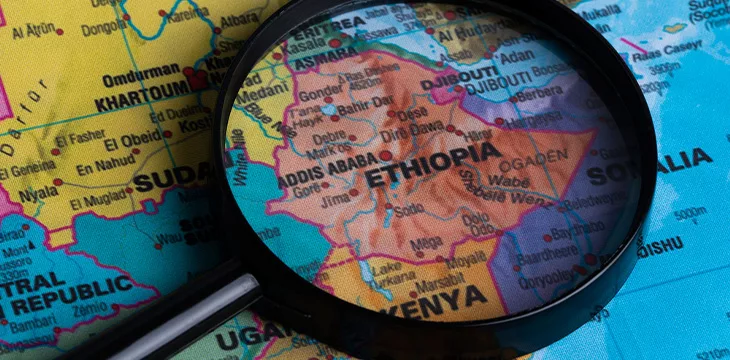Since being ousted by Xi Jinping’s government in 2021, China’s block reward miners have been temporarily seeking homes in Iran, Kazakhstan, Russia and some European countries. Now, these miners are said to have settled in Ethiopia, which cites low electricity costs and an ideal climate as its main attractions.
Ethiopia has been one of the world’s top mining equipment destinations since September 2023, according to data compiled by Luxor Technology. This comes despite the East African country’s turbulent history with digital assets, where trading remains illegal despite recently allowing mining.
According to a report by Bloomberg, Chinese miners have been the most prominent investors in the country. China’s grid operator reportedly signed contracts with 21 miners, 19 of whom are Chinese.
“Ethiopia will become one of the most popular destinations for Chinese miners,” says Nuo Xu, founder of the China Digital Mining Association.
Miners live or die by their ability to secure cheap power, with electricity costs accounting for more than 70% of overall overhead costs. Since China cracked down on block reward mining activities, affected miners have looked for homes in countries with lower power costs, with Iran and Kazakhstan as their initial targets. These countries later became hostile and cut the miners off the power grid as their demand for power increased.
When China oppressed the miners, the United States welcomed them. Today, Texas is the world’s block reward mining hub, accounting for approximately 25% of the total BTC hashrate. However, tensions between China and the United States have prevented most Chinese miners from turning to the West.
Bloomberg quoted Chinese mining industry executives as saying Ethiopia could become the home base they have been seeking for years, with some even claiming that Ethiopia could soon rival Texas. They told media outlets that low electricity costs, an ideal climate that reduces cooling costs and a strategic political and economic partnership with China make Ethiopia the perfect home base.
The Grand Ethiopian Renaissance Dam, nearing completion, will be Africa’s largest hydroelectric power plant, providing cheaper power for miners.
Some miners are so eager to get started that they disguise themselves as factories or agricultural facilities to jump right in.
For Ethiopia, the attraction for miners is that they use foreign currency to pay for power and other costs. The country has been in dire need of foreign exchange inflows for years amid rising costs of servicing dollar-denominated loans from the International Monetary Fund (IMF) and other global lenders.
However, despite all its advantages, the long-term preferences of miners in Ethiopia are unpredictable. For example, despite having the largest hydroelectric power plant in Africa, half of the population still has no access to electricity. Parts of the country have also been embroiled in civil war for decades.
As demonstrated in Kazakhstan, if the public raises enough questions, the government can turn its back on the miners. In the Central Asian country, widespread protests over fuel prices have expanded to include questions about electricity prices, and the government has been quick to blame miners.
Besides Ethiopia, miners are exploring the rest of Africa to expand their operations, with Nigeria and Angola as their top targets.
“Chinese miners have no problem building sites in Africa. It’s like another Chinese province,” Xu said. His organization, the China Digital Mining Association, has been organizing trips to African countries for miners to explore potential sites.
View: Think of Bitcoin Mining as Financial Self-Discipline
Are you new to blockchain? To learn more about blockchain technology, check out CoinGeek’s Blockchain for Beginners section, our ultimate resource guide.


